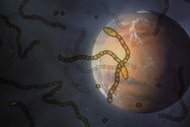Create a free profile to get unlimited access to exclusive videos, sweepstakes, and more!
NASA: Living in space apparently rearranges all your poop germs

In space, no one can hear you poop. So astronaut Scott Kelly, identical twin brother of retired fellow astronaut Mark Kelly, dutifully collected his own fecal specimens during his year aboard the International Space Station, for a long-term study on the effects living in space can have on all the tiny little things going on inside our bodies.
The twin-to-twin comparison offered NASA an invaluable opportunity to examine not only the effects of extended space dwelling on gut bacteria, but also on human DNA signatures. And when it comes to both germs and DNA expression, the study found that hanging around in orbit too long can have dramatic effects on both — even though the jury’s still out on whether that’s a good or bad thing.
Scott Kelly (he's the one without the mustache next to Mark in the above photo) spent almost a year on the ISS from 2015 to 2016, becoming the first NASA astronaut to live outside Earth’s atmosphere for so long a time. Mark remained firmly on terra firma throughout Scott’s extended space stay, and NASA gameplanned the study by collecting fecal samples from both brothers before, during, and after the mission.
What the agency found was that, especially during the final six months of Scott’s orbit, things started changing — like crazy.
Scott “experienced a shift in the ratio of two major categories of bacteria in his gut microbiome,” observed Northwestern University’s Fred W. Turek, one of the researchers who collaborated with NASA for the study. “The diversity of bacteria in his microbiome, however, did not change during spaceflight, which the Northwestern University-led research team found encouraging.”
Specifically, the ratio of Firmicutes to Bacteroidetes — the two bacteria types that make up 90 percent of the human intestine’s microbiome, “experienced a pronounced shift” during Scott’s time aboard ISS, with the number of Firmicutes increasing, and that of the Bacteroidetes decreasing. “This shift was among the greater compositional change that the researchers noted in Scott Kelly's microbiome, which returned to normal after he came back to Earth,” the report, summarized at science website EurekAlert!, noted.
“There was some kind of wholesale shift in remodeling of the structure of this community of microorganisms,” said Northwestern scientist Martha Vitaterna. “We cannot say whether it's good or bad.”
In other words, it may be too early to say whether living on the ISS leads to IBS. Similar shifts in gene behavior also appeared, though those results are expected to be explained at greater length when NASA’s full report arrives later this week.
The poop study is just one of 10 different twin-to-twin comparisons NASA researched as part of Scott Kelly’s mission. The results of all the studies, which cover the effects of long-term space stays on bodily processes ranging from bone density to immune system behavior to gene expression, will appear April 12 in the journal Science.
We’re eagerly awaiting the full report — because it definitely sounds like some interesting bathroom reading material.


























